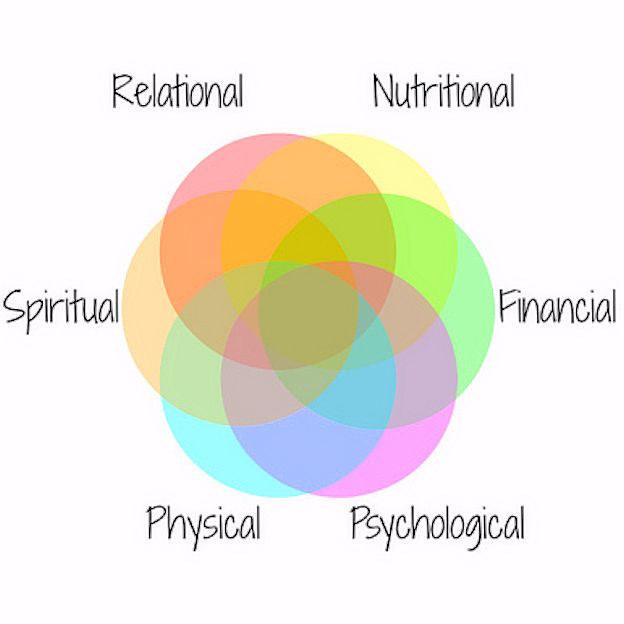
The Laws of Wellness, a review and analysis of a great book by Greg Anderson about the importance of having a holistic approach to life, health or difficulties.
This book addresses wellness as “the only real and lasting means of health care reform.” In his book, Greg Anderson uses, “Wellness is the complete integration of body, mind, and spirit – the realization that everything we do, think, feel, and believe has an effect on our state of well-being.”
John W. Travis
One of the simplest, most sincere and effective books that deserves to be read and followed by all men of good will.
Carl William Brown
The happiness of your life depends upon the quality of your thoughts.
Marcus Aurelius
Health is a state of complete physical, mental and social well-being, and not merely the absence of disease or infirmity.
World Health Organisation
Greg Anderson is the author of six books, including the international bestseller The Cancer Conqueror, and founder of the American Wellness Project. Through lectures and workshops and as a consultant to businesses and health-care organizations, he is recognized as one of America’s foremost wellness authorities.
The author is known for his work in the field of cancer recovery and wellness programs. He founded the Cancer Recovery Foundation International Group of Charities, which is dedicated to supporting individuals dealing with cancer and promoting holistic approaches to cancer care and overall well-being.
He has written six books, including the international bestseller The Cancer Conqueror, an Incredible Journey to Wellness. Through lectures and workshops and as a consultant to businesses and health-care organizations, he is recognized as one of America’s foremost wellness authorities.
Greg Anderson lived an experience that profoundly transformed him: in 1984 he was diagnosed with lung cancer and the poor prognosis gave him just a month to live. Intimately convinced that everyone is responsible for their own state of health, he undertook a healing journey that allowed him to defeat the disease.

Being convinced that well-being is identified in complete harmony between body, mind and spirit and that this state is clearly conditioned by our actions, thought, feeling and belief, Greg Anderson has identified twenty-two rules that emphasize the importance of holistic health and wellness, focusing on various aspects of one’s life, including nutrition, stress management, exercise, and emotional well-being. Greg Anderson’s work has had a positive impact on many individuals facing cancer, as well as those interested in adopting a more comprehensive approach to their health.
Carl William Brown
The 22 Non-Negotiable Laws of Wellness: Feel, Think, and Live Better Than You Ever Thought Possible by Greg Anderson
Wellness is one of the greatest and most powerful words in the English language. Unfortunately, it is also one of the least understood. But start putting this word into your vocabulary and the concepts it entails into your life. Wellness is one of the most important ideas of our time.
Wellness is the complete integration of body, mind and spirit – the realization that everything we do, think, feel, and believe has an effect on our state of well-being. Wellness is a choice, a decision we make to move toward optimal health and maximum life. Wellness is a process – awareness that there is no end point but health and happiness are always possible in the present moment, here and now.
Wellness is not a “medical fix” but a way of living – a lifestyle sensitive and responsive to all the dimensions of body, mind, and spirit; an approach to life we each design to achieve our highest potential for well-being now and forever.
Medicine deals with one dimension, the body. Old self-help ideas dealt with one dimension, typically the mind. Wellness involves an all-inclusive paradigm shift. Its practice encompasses six major life areas – the physical, emotional, social, intellectual, vocational, and spiritual spheres. Wellness is not a piecemeal approach; it involves the total you!
Traditional medicine finds a problem – a symptom – treats it. The goal is to neutralize symptoms, to return to a point of no discernible illness. This is the disease model of medicine. Preventive medicine, trumpeted by an increasing number in the medical community, is also based on the disease model. The goal is the same: no discernible illness.
Wellness strives for a new standard. No matter what our state of health, wellness calls for continuing improvement and self-renewal in all areas of life. Wellness seeks more than the absence of illness; it searches for new levels of excellence. Beyond any disease-free neutral point, wellness dedicates its efforts to our total well-being – in body, mind and spirit.

The 22 Non-Negotiable Laws of Wellness distills more than a decade of experience in the field of health enhancement and life enrichment into a set of basic laws that govern success and failure in the pursuit of total wellness. This describes the fundamental rules of the wellness pursuit.
Be challenged. Learn. Then do. There’s no substitute for the commitment to implement. I hope my own journey and those of literally tens of thousands of patients. I have learned from and shared with will help you attain greater wellness. You may find some of the laws challenging, but keep in mind that they are all true guideposts for living. I wish you well on your own journey to wellness.
The Law of Esprit: The joy you feel is life!
The single overriding objective in wellness is creating constant personal renewal where we recognize and act on the truth that each day is a miraculous gift and our job is to untie the ribbons.
That’s the Law of Esprit: living life with joy.
The Law of Personal Accountability: If it’s going to be, it’s up to me. – Robert H. Schuller
It shouts that we have the ability to choose both our behaviors and our responses! It’s more than stress management; it’s personal choice.
The Law of Unity: The part can never be well unless the whole is well. – Plato
Body, mind, and spirit work together.
The Law of Physical Activity: Use it or lose it.
The critical importance of exercise has been recognized for centuries. Modern studies confirming its positive influence are legion. The message is repeated in newspapers and magazines and on television. From grade schools to nursing homes, throughout our lives, the message is clear: we need to exercise! There’s little room to debate the powerful Law of Physical Activity.
The Law of Nutritional Frugality: A little with quiet is the only diet. – Scottish proverb
The core message of the Law of Nutritional Frugality is simple: eat a variety of unprocessed foods, in moderate amounts, during at least three meals, including breakfast, combined with a smart afternoon snack, while drinking eight glasses of pure water and taking a broad-spectrum vitamin-and-mineral supplement each day.
The Law of Minimal Medical Invasiveness: The art of medicine is generally a question of time. – Ovid
Honor and esteem the doctor who says, “We want to treat you right but do only what is absolutely necessary, and with minimum side effects. We’re going to help your body heal!” Here is a person who understands the Law of Minimal Medical Invasiveness.

The Law of Stress-Hardiness: It’s not what happens to you. It’s what you do about it. – W. Mitchell “survivor”
The law states that stress is to be not only expected but preferred. The law’s corollary states that we can and should welcome stress and that we can and should develop a positive, workable approach to stress management.
The Law of Emotional Choice: Learning to be aware of feelings… is an essential lifetime skill. – Joan Borysenko (author of Minding the Body, Mending the Mind)
There’s a hierarchy in our lives that governs our sense of satisfaction. The Law of Emotional Choice is near the top of the heap… The best way to confront fears and anxieties is to invoke the Law of Emotional Choice. Face the fear. Do something about it. Push through it. Go for it! Consistently exercising the Law of Emotional Choice builds an inner strength that is unshakable. This is self-esteem of the best and highest order.
The Law of Developmental Motivation: Use what talents you possess: the woods would be very silent if no birds sang except those that sang best. – Henry Van Dyke
When we are motivated by goals that have deep meaning, by dreams that need completion, by pure love that needs expressing, then we truly live life! For many, this often means a longer life. The type of motivation that drives our lives is an important part of experiencing total wellness. A deep sense of fulfillment comes only from a serious commitment to a life filled with purpose, with striving for higher ideals. Therein lies true happiness.
The Law of Human Dignity: God created man in His own image. – Genesis
This law won’t allow for such categorizing and judging. Respect is the key… The law of human dignity carries with it a mandate: to stop our pettiness and quit putting each other in little boxes that diminish the dignity and potential of all. In short, when you give me respect and I give you respect, we will both be better for it.
The Law of Win/Win: Do unto others as you would have others do unto you. – The Golden Rule
We must stay longer in the communication process. We must express ourselves with greater courage. At the same time, we must listen more carefully and in greater depth. Win/win means we strive for understanding first. We seek to be understood second.
The Law of Present-Moment Living: Be here now. – Ram Dass
It is the antithesis of procrastination. We can put off unpleasant activities, but in doing so we also put off the enjoyable ones. We ration our pleasure and contentment as if the supply were limited.
The Law of Mindfulness: The mind is its own place, and in itself can make a heaven of Hell, a hell of Heaven. – John Milton
Choose where you focus, and focus on thoughts that nurture. Concentrate on what you have, not what you’ve lost. You’ll see the results in your health and your life.
The Law of Creativity: Imagination is the eye of the soul. – Joseph Joubert
It calls not for my way or your way, but for the best way. This is the picture, the idea we must find and hold on to without wavering. Then we create wellness in body, mind, and spirit, wellness of the highest level.

The Law of Lifetime Growth: We must always change, renew, rejuvenate ourselves; otherwise we harden. – Goethe
It demands both a cultural change and a megashift in our own thinking about all life can be. This law of wellness represents a great hope for people of all ages, all states of wellness, all cultures.
The Law of Life Mission: He dies every day who lives a lingering life. – Pierrard Poullet
Conventional wisdom says, “If you have your health, you have everything.” Don’t believe it. It’s not so much that this old adage is wrong as that there is a higher truth. The Law of Life Mission holds, “If you have a purpose, you have everything.”
The Law of Purpose Through Service: Try not to become a man of success, but rather try to become a man of value. – Albert Einstein
Mission comes alive only through service – the idea of caring for others. There’s magic in this law. When we serve with depth and sincerity, we get a glimpse of the essential quality of who we really can become… We must think through, personalize, and understand both intellectually and emotionally this idea of finding purpose through helping others.
The Law of Stewardship: If you want happiness for a lifetime, help the next generation. – Chinese proverb
The quest for personal wellness is an illusion without a commitment to the wellness of all and the entire universe. We do not stand alone. The people of this planet are interdependent in all things… The Law of Stewardship requires us to pass the planet on to future generations in a better condition than we found it in… In the final analysis, the Law of Stewardship requires us to manage our lives in such a way that we hold in high regard the welfare of others and leave things better than when we found them. We are all stewards. Let’s rise to meet our responsibilities.
The Law of Forgiveness: Forgiveness restores our hearts to the innocence that we knew – an innocence that allowed us the freedom to love. – Robin Casarjian (author of Forgiveness: A Bold Choice for a Peaceful Heart)
Forgiveness is one of the most beautiful words in the English language. Mark this as one of the great truths of the collective wisdom passed down through the centuries: life can be lived most abundantly as an adventure in forgiveness.
The Law of Gratitude: Affirm the good things.
The wellness path requires us to embrace a proactive expression of sincere gratitude. Try it for a week, a day, an hour. Observe the results. You will be amazed at the changes in yourself, your health, your relationships, your career – your entire life.
The Law of Personal Peace: Without inner peace, it is impossible to have world peace. – The Dalai Lama
The way of peace? Through prayerful meditation, a forgotten and misunderstood discipline. Prayerful meditation is an excellent way to develop increased awareness in all areas of life. But it is essential in attaining and sustaining personal peace.
The Law of Unconditional Loving: … and the greatest of these is love. – Saint Paul
All success, all well-being, all self-improvement has its basis in an unfathomable spirit that sustains us even when we may be least aware of it. That spirit is love.
On the same topic, you can also read:

